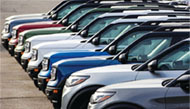Hyundai and GM Hit the ‘Innovation Accelerator’… “Full Cooperation Across All Sectors”
▶ Joint Development and Production of Passenger and Commercial Vehicles
▶ Collaboration on Electric, Hydrogen, and Internal Combustion Engine Technologies

Euisun Chung (right), Chairman of Hyundai Motor Group, and Mary Barra, Chairperson and CEO of General Motors (GM), shake hands after signing a Memorandum of Understanding (MOU) for comprehensive cooperation. [Yonhap]
Hyundai Motor Group announced on the 12th that Chairman Euisun Chung met with GM Chairperson and CEO Mary Barra at the Genesis House in New York and signed a ‘Memorandum of Understanding (MOU)’ for comprehensive cooperation. Hyundai and GM have agreed to collaborate on the joint development and production of passenger and commercial vehicles, internal combustion engines, eco-friendly energy, as well as electric and hydrogen technologies. Both companies are also exploring the possibility of jointly procuring essential EV battery materials, steel, and other raw materials.
Chairman Chung stated, “This partnership provides Hyundai and GM with opportunities to enhance competitiveness in key global markets and vehicle segments. By leveraging both companies' expertise and innovative technologies, we will improve efficiency and increase customer value.” Chairperson Barra echoed this sentiment, saying, “The partnership between the two companies has the potential to make product development more efficient through streamlined capital allocation. With complementary strengths and capable organizations, we can utilize scale and creativity to deliver competitive products to customers more quickly and efficiently.”
Alongside this MOU, Hyundai and GM plan to identify projects for collaboration. The surprising announcement of such a comprehensive cooperation plan is seen as a bold move, reflecting the changing landscape of the global automotive industry. The automotive media outlet Motor1.com highlighted that “the collaboration between the two sides was an unexpected event.”
Based on first-half sales figures this year, Hyundai Motor Group ranked 3rd globally with 3.62 million units sold, while GM ranked 6th with 2.78 million units.
Historically, internal combustion engine technology has been dominated by German automakers, and American companies have excelled in the SUV market. However, Hyundai Motor Group has been rapidly advancing in the future mobility industry, primarily represented by EVs. Hyundai and Kia's market share in the U.S. mid-size SUV segment exceeds 20%, and their EVs rank second, trailing only Tesla.
The collaboration vision presented by the two companies includes the joint development of internal combustion engine technology, EVs, and hydrogen technology, as well as shared procurement of batteries and steel. The industry predicts that the partnership between Hyundai and GM could turn them into a ‘superpower’ in the mobility market.
Hyundai excels in the U.S. market with compact and mid-size SUVs like the Tucson and Santa Fe, while GM holds strong in the large SUV and pickup truck segments with brands like Chevrolet, GMC, and Cadillac, which lead in models like the Tahoe, Escalade, and pickups. The collaboration could also mean that Hyundai will push ahead with the development of large SUVs and pickup trucks through its partnership with GM.
For GM, the collaboration may strengthen its relatively weak EV segment. Hyundai, thanks to the success of its Ioniq 5, is recognized as Tesla’s only major competitor in the U.S. small EV market. On the other hand, GM, which has shown strength in the pickup truck market, faces increasing competition as Tesla’s Cybertruck enters the scene.
However, there are challenges the two companies will need to overcome. Several global automakers, such as Toyota and BMW, BMW and Honda, and Ford and Volkswagen, have entered into partnerships for joint development of technology, but few have succeeded. To avoid the pitfalls faced by others, Hyundai and GM are committed to identifying specific projects for full-scale collaboration.
By Hongyong Park, Reporter
<Hongyong Park>
스마터리빙
more [ 건강]
[ 건강]이제 혈관 건강도 챙기자!
[현대해운]우리 눈에 보이지 않기 때문에 혈관 건강을 챙기는 것은 결코 쉽지 않은데요. 여러분은 혈관 건강을 유지하기 위해 어떤 노력을 하시나요?
 [ 건강]
[ 건강]내 몸이 건강해지는 과일궁합
 [ 라이프]
[ 라이프]벌레야 물럿거라! 천연 해충제 만들기
 [ 건강]
[ 건강]혈압 낮추는데 좋은 식품
[현대해운]혈관 건강은 주로 노화가 진행되면서 지켜야 할 문제라고 인식되어 왔습니다. 최근 생활 패턴과 식생활의 변화로 혈관의 노화 진행이 빨라지고
사람·사람들
more
“최첨단 신차들… LA 오토쇼에서 경험하세요”
118년의 전통을 자랑하는 세계적인 자동차 축제 ‘LA 오토쇼’가 오는 21일부터 30일까지 LA 컨벤션센터에서 대대적으로 열린다. 전 세계 …

파바월드 펀드레이징 골프 토너먼트 성황
파바월드(대표 명원식)는 지난달 31일 캘리포니아 컨트리클럽에서 2025년 파바월드 펀드레이징 골프 토너먼트를 개최했다. 130여 명의 후원자…
KAMA USA 시니어모델협 8일 기금 마련 바자…
KAMA USA 시니어모델협회(회장 백은경)가 오는 8일(토) 오전 11시부터 오후 2시30분까지 LA 한인타운 윌셔와 후버 코너에 위치한 컬…
타운에 첫 한인 운영 수학·과학 정규학교
LA 한인타운에 수학·과학에 특화된 정규 사립중학교 ‘윈저 아카데미’(WMSA, 4055 Wilshire Blvd. #400, LA)가 지난 …
서각협회 ‘서각 교류전’ 11월1일 리앤리 갤러리
한국목우서각협회(회장 정기호)와 미주한인서각협회(회장 이애령)가 11월 1~8일 LA 한인타운 리앤리 갤러리에서 서각교류전을 갖는다.가주 의회…
많이 본 기사
- 국힘, ‘秋영장’에 시정연설 불참… “이젠 전쟁, 李정권 끌어내려야”
- 다저스 우승 퍼레이드, LA 한복판 충돌…경찰차 공격·폭발까지 아수라장
- 이종간 장기이식 첫 정식 임상시험…유전자 편집 돼지 신장
- LNG 최대 수출국 美, 10월 수출량 1천만톤 첫 돌파
- “이러니 한국 청년들이 결혼 안 하지”…日언론도 경악한 韓결혼 비용 얼마길래
- ‘슈퍼예산’ 설득 나선 李대통령…AI 집중투자로 新성장동력 모색
- 尹, 특검 기소 체포방해 재판 출석…김성훈·박종준 증인신문
- 무역 휴전 후… “중국, 1년여 만에 미국산 밀 수입도 추진”
- ‘구속영장 청구’ 추경호 “불체포특권 포기…당당히 임하겠다”
- “정국,온세계가 당신의 솔로 콘서트를 갈망합니다” 글로벌 팬들 위버스 라이브서 응원
- “길거리에 보이는 사람들 확 날씬해졌네”…기분 탓 아니라 진짜인 ‘이 나라’, 무슨 일?
- “체포된 핼러윈 테러 공모자들, ‘제2의 파리 IS 테러’ 모의”
- 中에 구금 조선족 목사 가족, 美신문 기고 통해 부친 석방 호소
- 트럼프 “뉴욕, 공산주의자 맘다니 시장되면 완전한 재앙될 것”
- 고물가 속 ‘대출의 덫’ 빠진 미국… ‘중산층 붕괴’
- 더욱 깐깐해진 시민권 심사
- 손흥민, MLS 플레이오프 8강전서 토마스 뮐러와 격돌
- 李대통령 “국방 외부의존은 자존심 문제…남북대화 대승적 노력”
- 트럼프, 젠슨황에 흔들렸지만…시진핑 회담서 블랙웰 안건 배제
- 김하성, 1천600만달러 포기하고 FA 시장 나왔다…옵트 아웃 행사
- “ ‘무소불위’ HOA 이제 그만”… 권한 대폭 제한
- “편도 수술, 해? 말어?” 고민 끝… 기준 정해드립니다
- 팔란티어, 3분기 매출 11억8천만 달러 ‘역대 최고’…시장전망 상회
- 국토안보부 “운전면허 기록 공유하라” 파문
- LNS 인베스트먼트… 한국 부동산 분양 ‘박차’
- 보잉 7년 적자 끝 ‘턴어라운드’ 조짐 ...월가 “주가 최대 50% 상승도”…엔지니어 출신 CEO 기대
- “푸드스탬프 중단은 불법”
- 셧다운발 항공 ‘대혼란’… LAX 등 운항 차질 심화
- 버지니아·뉴저지 선거에 이목… ‘트럼프 2기’ 첫 시험대 될까
- “전기가 새로운 원유”… 구글도 멈춘 원전 다시 돌린다
- 메타, 채권 발행 250억달러 조달
- 아이온큐·엔비디아 쓸어담았다…개미, 10월 해외 주식 9조원 ‘폭풍 순매수’
- 조지아 이민단속 여파… 한국 기업들 투자 철회
- 비트코인 ‘업토버’ 7년 만에 끝났다
- 자동차주 ‘불기둥’에…현대차, 시총 3위 ‘바짝’
- ‘광란의 사랑’ 등 오스카 후보 3회 배우 다이앤 래드 별세
- [존청 변호사의 “경제·법률 핫이슈”] 내 집 한 채가 전부인데… 리빙 트러스트가 정말 필요한가?
- LA시, 중소기업 조달시장 컨벤션 행사 개최
- 삼성전자, 특허 소송서 연달아 패배
- ‘서풍’
- 우리가 감사하며 살아가야 할 생명체
- 엔젤레스 국유림 차량 전복 한인 사망
- 오픈뱅크, 저소득층·노년층 지원 사업도 시작
- 방송 플랫폼 둘러싼 기업간 ‘알력다툼’
- “자연스러움 기대했다가, 불안·우울”… 유방암 재건수술, 뜻밖의 연구 결과
- [지평선] 러너들에게만 천국인 서울
- ‘미스코리아 진’ 김지연, 75kg 살찐 놀라운 근황
- ‘야구의 신’을 놓친 양키스, “야마모토도 NYY 좋아했다, 357억 더 썼어야” 후회해도 늦었다
- ‘유흥업소 출입 의혹’ 김준영, 소속사 쉴드 불가.. “모든 작품서 하차”
- ‘돈치치·리브스 동반 폭발’ 레이커스, 서부 3위로
1/5지식톡

-
 테슬라 자동차 시트커버 장착
0
테슬라 자동차 시트커버 장착
0테슬라 시트커버, 사놓고 아직 못 씌우셨죠?장착이 생각보다 쉽지 않습니다.20년 경력 전문가에게 맡기세요 — 깔끔하고 딱 맞게 장착해드립니다!장착비용:앞좌석: $40뒷좌석: $60앞·뒷좌석 …
-
 식당용 부탄가스
0
식당용 부탄가스
0식당용 부탄가스 홀세일 합니다 로스앤젤레스 다운타운 픽업 가능 안녕 하세요?강아지 & 고양이 모든 애완동물 / 반려동물 식품 & 모든 애완동물/반려동물 관련 제품들 전문적으로 홀세일/취급하는 회사 입니다 100% …
-
 ACSL 국제 컴퓨터 과학 대회, …
0
ACSL 국제 컴퓨터 과학 대회, …
0웹사이트 : www.eduspot.co.kr 카카오톡 상담하기 : https://pf.kakao.com/_BEQWxb블로그 : https://blog.naver.com/eduspotmain안녕하세요, 에듀스팟입니다…
-
 바디프렌드 안마의자 창고 리퍼브 세…
0
바디프렌드 안마의자 창고 리퍼브 세…
0거의 새제품급 리퍼브 안마의자 대방출 한다고 합니다!8월 23일(토)…24일(일) 단 이틀!특가 판매가Famille: $500 ~ $1,000Falcon: $1,500 ~ $2,500픽업 & 배송직접 픽업 가능LA…
-
 바디프렌드 안마의자 창고 리퍼브 세…
0
바디프렌드 안마의자 창고 리퍼브 세…
0거의 새제품급 리퍼브 안마의자 대방출 한다고 합니다!8월 23일(토)…24일(일) 단 이틀!특가 판매가Famille: $500 ~ $1,000Falcon: $1,500 ~ $2,500픽업 & 배송직접 픽업 가능LA…
케이타운 1번가
오피니언
 문태기 OC지국장
문태기 OC지국장 GG 코리아타운 한인 시니어 ‘보금자리’
 민경훈 논설위원
민경훈 논설위원우리가 감사하며 살아가야 할 생명체
 박홍용 경제부 차장
박홍용 경제부 차장 AI 혁명의 명암, 샌앤젤레스가 던지는 경고
 정유환 수필가
정유환 수필가 [화요칼럼] 캘리에서 온 가을
 이영태 / 한국일보 논설위원
이영태 / 한국일보 논설위원 [지평선] 러너들에게만 천국인 서울
 이육사
이육사 ‘서풍’
 옥세철 논설위원
옥세철 논설위원인구 고령화, 그 예기치 않은 선물은…

남아선호는 옛말(?)
 캐슬린 파커 워싱턴포스트 칼럼니스트
캐슬린 파커 워싱턴포스트 칼럼니스트 [캐슬린 파커 칼럼] ‘트럼프 연회장’은 도금된 창고
1/3지사별 뉴스

본선거 하루 앞…“투표합시다”
11월4일 본선거가 하루 앞으로 다가온 가운데 뉴욕일원 주요 한인단체들이 2일 한인상점들이 몰려 있는 퀸즈 노던블라바드 156가 머레이힐 샤핑…
뉴욕·뉴저지 한인 유권자 10만명 육박

총기 규제, 마리화나 흡연엔…
거의 매일 총기사고가 발생하고 있지만 미국에서 총기는 쉽게 손댈 수 없는 ‘뜨거운 감자’다. 연방법은 약물 사용자에 대한 총기 소유를 규제하고…
“꼭 투표하세요”민주당 정치인들, 투표독려

美 “中, 조선·해운 보복조치 철회키로”…한화오션 제재 풀리나
도널드 트럼프 대통령과 시진핑 중국 국가주석이 타결한 무역 합의의 일환으로 중국이 한화오션의 미국 자회사에 부과한 제재를 철회할 가능성이 제기…
“총영사관 등 사칭 보이스피싱 주의 하세요”

오늘 하루 이 창 열지 않음 닫기 



















































.png)


댓글 안에 당신의 성숙함도 담아 주세요.
'오늘의 한마디'는 기사에 대하여 자신의 생각을 말하고 남의 생각을 들으며 서로 다양한 의견을 나누는 공간입니다. 그러나 간혹 불건전한 내용을 올리시는 분들이 계셔서 건전한 인터넷문화 정착을 위해 아래와 같은 운영원칙을 적용합니다.
자체 모니터링을 통해 아래에 해당하는 내용이 포함된 댓글이 발견되면 예고없이 삭제 조치를 하겠습니다.
불건전한 댓글을 올리거나, 이름에 비속어 및 상대방의 불쾌감을 주는 단어를 사용, 유명인 또는 특정 일반인을 사칭하는 경우 이용에 대한 차단 제재를 받을 수 있습니다. 차단될 경우, 일주일간 댓글을 달수 없게 됩니다.
명예훼손, 개인정보 유출, 욕설 등 법률에 위반되는 댓글은 관계 법령에 의거 민형사상 처벌을 받을 수 있으니 이용에 주의를 부탁드립니다.
Close
x